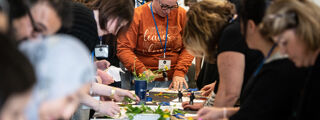The 'Evaluation of the Birmingham Arts School Model' project has played a key role in enhancing arts education and cultural engagement across the city. Funded by Arts Connect and the Esmée Fairbairn Foundation, the research has facilitated collaboration between schools and a range of cultural organisations to expand access to high-quality arts education.
By creating partnerships and embedding cultural opportunities into schools, the project has strengthened Birmingham’s cultural infrastructure and enriched the lives of many young people.
It has been particularly impactful in addressing disparities in cultural access, targeting underserved areas in Birmingham through the Cultural Landscapes map, which identifies schools in 'cold spot' areas, ensuring more equitable access to cultural opportunities.
By fostering inclusivity and expanding access to the arts for young people from diverse backgrounds, the project has significantly impacted local communities. Schools involved in the project reported enhanced cultural offerings, and new collaborations with artists and creative organisations.
Importantly, the research has successfully reached underserved communities and less-engaged schools, providing young people – regardless of their background – new opportunities to engage in the arts.
The project’s initiatives, such as ‘Proud to be a Brummie’, have promoted community engagement, and cultivated a sense of pride and ownership of Birmingham’s cultural identity.
Long term, the research collected by BCU provides a valuable foundation for the future of arts education in Birmingham. The insights from this project will be essential for shaping long-term strategies for sustaining the city’s cultural offer.
Despite challenges such as financial constraints and curriculum pressures, the project has demonstrated the potential for a more inclusive cultural ecosystem in schools.
Moving forward, the continued partnerships between schools and cultural organisations, alongside development of tools like the Cultural Landscapes map, will be key to ensuring that arts education remains a central and accessible part of young people’s educational experience in Birmingham.
Methodological Approach:
In order undertake this work, the team proposed to conduct a number of evaluative activities that will contribute to understanding the rich picture of the Birmingham Art Schools programme. This includes the ways in which it impacts upon the organisations involved, as well as teaching and learning, children and young people’s educational and wider development, curriculum, the delivery of the programmes and sustainability after the funding period.
Theory of Change:
As experienced researchers in the arts education field, the BCU team regularly work using a tailored range of research methods and approaches. They are experienced working with Theory of Change models as part of evaluation processes for a wide range of arts project partners and would welcome the opportunity to support and develop a Theory of Change (ToC) for Birmingham Art Schools.
Designing a Theory of Change equates to a roadmap, that outlines planned steps to achieve desired goals.
Using the Theory of Change collaborative research method, the team know this gives the best mechanism to ensure continued engagement from all stakeholders. A demonstration of the team's expertise in developing Theory of Change models can be found in Prof. Fautley’s evaluation of the Teach Through Music continuing professional development programme and Dr Kinsella’s creation of a theory of change for the Creativity Collaboratives project.
Project team
- Dr Victoria Hadjinestoros-Kinsella
- Dr Martin Faultey
- Dr Anthony Anderson
- Dr Emma Nenadic
